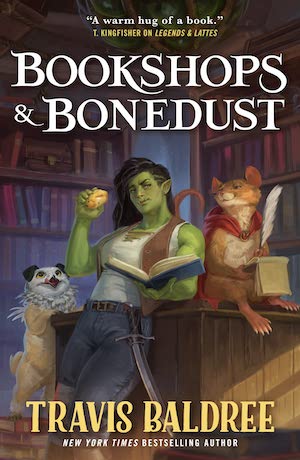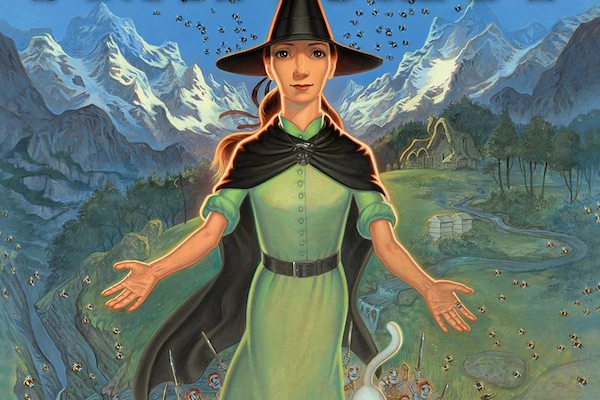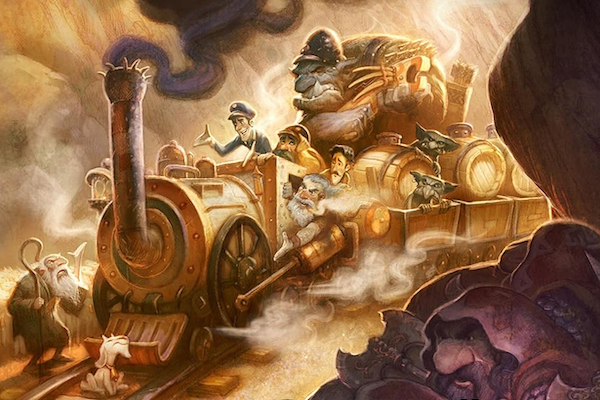Time for a mud fight! Wait, no, not that kind of… you know, nevermind.
Summary
Sally gets her first hazing with garlic in her locker, but she is already prepared, and gets the officer back immediately (with a turnip full of chili seeds carved to look like garlic and eaten on a dare). Carrot calls her in to discuss her handling of the situation and recruit her to the Hamcrusher case. The imp in Vimes’s Gooseberry insists that it can help with his sums and Vimes winds up asking it to help by sorting through his paperwork and find out if dwarfs have been shifting much in all their digging underneath the city. Cheery tells Vimes that some trolls have come to see him, and they tell him that Chrysophrase wants to see him. When they threaten his family, Detritus hammers one of them on the head for having no manners. Vimes knows he needs to meet the troll regardless, and hearing about a few more resignations, he makes a speech to the officers about knowing where they stand and who they stand with. There is an ancient creature in the city, clinging to a mine. Vimes meets Chrysophrase in the Pork Futures Warehouse, and the troll tells him that a troll killed Hamcrusher, and that he wants Vimes on the case or the trolls will be very unhappy and harder to control. They’ll wait for the Watch to sort things out for now.
Buy the Book


Bookshops and Bonedust
Vimes asks who Mr. Shine is and gets told that it’s an old troll folk hero; he also gets a tip about some old lady making cakes on Turn Again Lane and a new troll drug called Slide, which is much worse than Slab. He tells Detritus to gather a crew and check out Turn Again Lane. He learns that it’s nearly six o’clock; he doesn’t have enough time to get home. He sends up a message via the clacks and Carrot shuts down two major thoroughfares at rush hour to get him to his front door: It’s time to read to Young Sam, and Vimes has promised never to be late for that. He wakes hours later and comes into the library where Sybil is with Carrot and Sally. They went down into the mine and found further evidence of a troll interloper, which strangely seemed to panic Ardent into believing the troll was still there. Angua picks up a scent, bothered by the presence of Sally, and asks them to open a door they claimed had water behind it. They do so and dwarfs come forward to burn the space with flamethrowers to be certain it’s “safe.” The scent makes Angua faint. Vimes is stunned to hear about the flamethrowers as they could easily be used as weapons, and wants it known that no one should be aboveground with them.
Vimes tries to pare down the problems, since they’re rapidly approaching a redux of Koom Valley with the evidence found. He asks about the Following Dark sign again, and Carrot explains that dwarfs draw signs as a sort of vote-by-grafitti for a mine’s general mood. They also believe that certain types of dark are alive, and influence dwarfs to write them out. The Following Dark is one of the worst of these—it’s a pervading sense of dread. The dwarfs and trolls are setting up for a riot in the city center. Carrot has already made the arrangements, but Vimes insists on being there because he can’t tell Vetinari that he was at home if something terrible breaks out. Sybil has already packed him food. Brick has fallen in with a gang of trolls and is hiding amidst them, not being sure what else to do. He gets back to the Watch House where everything is getting more frantic by the minute and the “Specials” squad has been rounded up—that’s special constables that they deputize in moments when there’s too much heat and not enough officers. Mr. Pessimal begins to bother Vimes again, so he’s put into the Specials roundup too. They set up in the center between the groups, Carrot and Cheery taking the dwarfs and Vimes and Detritus taking the trolls.
Angua is down in the mine, trying to figure out what happened, and she can smell Sally down there. She comes across three dwarf bodies, and Sally, who insists that the dwarfs found something that killed them. The two of them are naked—changing back from a group of bats and a werewolf does that (though not to vampire men, oddly)—and begins to argue about Carrot. Sally points out that they should charge admission given the nudity, and the fighting, and the mud all around them. They continue investigating and come across another body that wrote a very bad sign on the wall in blood. The riot has been avoided thanks to the Watch, but Vimes still has two broken ribs and an order to report to Vetinari. Angua and Sally make it to the surface, but Angua can smell Nobby nearby and is determined not to be seen naked by him. Nobby and Fred are at the Pink PussyCat Club watching Tawneee (real name Betty) dance, and hear Angua’s voice from below, directing them to get clothes immediately. Vetinari wants to know why the riot seems to have been avoided by suspiciously-appearing very strong alcohols, and Vimes declines to answer. The Patrician is also shocked to hear that his clerk sustained injuries fighting a troll… which he sustained in combat with a very confused Brick.
Commentary
This is one of the few Discworld books that plays with time in bits of flashback, the kind where a character relays what happened previously to another character, and I love how it’s used. Especially the one at the end of this section (which I should have pushed later), mainly due to Vetinari’s reaction about his clerk going for broke on a troll thirty times his size. We can talk about that next week.
But the trick to stop the riot is a damned clever one, frankly. And I do appreciate the suggestion that trickery is necessary in this instance because sometimes you simply can’t talk people down. (And sometimes you can and should work much harder to do so. But they’ve got limited means at the moment.) We’ve had points in these books where Carrot could stand between people and get them to listen, but that’s never going to work every time. Vimes actually managed a solution that, while morally gray as hell, still ultimately got a better result than the one they walked into Sator Square with.
There’s a lot here about changes bringing a certain level of anonymity that irks. Nevermind not knowing about the dwarfs mining below the city and trying to cover up murder—Vimes thinks about how he doesn’t really know the majority of the Watch now, specifically that he doesn’t know most of these people down to their bones, understand them as people: “It wasn’t really his Watch anymore. It was the city’s Watch. He just ran it.” And that’s what the social contract is meant to create, something for the entire city, but this brings up a difficult point; the larger a system gets, the easier it is for corruption to seep in because you can’t know every piece of it. Too many faces, too much paperwork.
We get a very clear juxtaposition with two uses of the phrase “a leopard couldn’t change its shorts,” once from Vimes thinking that Detritus is proof that a leopard can do so, while Angua is thinking of Sally as proof that they can’t. This isn’t the first time that Angua has had prejudices that she couches in how much the world downplays her difficulties. And, of course, many of the things she has understandable angst over are things that Sally would probably recognize too—the constant urge to revert to instinct, the expectation that they can and should be “tamed” to human cultural norms, the stereotyping and physical discomfort.
I do love that Pratchett manages to make a “women in a mud fight” joke that’s funny. But I’m also always aggravated by the story not going a more entertaining route on this Boy-Is-Mine tiff: Make them a throuple! Sally is clearly bi, and Angua frequently gives those vibes, too, really. And yes, the idea would freak Carrot out, which would probably be good for him when all is said and done. Plus you’d get extra comedy from how much it would confuse everyone in the Watch, Vimes especially.
Sorry, I just think that’s a much more entertaining way of ending a “step off my man” fight. And would be far from the weirdest thing to happen in these books.
But I come back to the leopard changing shorts bit because the themes throughout the book hit hard on the idea of whether or not people can change, and is ultimately working toward an even more important point: People are never what you think at face value. Vimes is surprised that Detritus has changed from what he remembers, but that version of Detritus was always in there; he just needed an opportunity to be different. Sally, too, isn’t what she appears to be, something that Vimes is already cottoning on to without knowing why. No one is ever all their silly stereotypes.
I’m also always struck by the whole section of Vimes racing home and reading to Young Sam. Not just the urgency in not making excuses as a father (ugh, sometimes he is truly just so good, for all that he’s a right bastard), the fear that everything in his life has been too good and therefore must get destroyed (a relatable feeling if ever there was one, when you suddenly have a streak of good fortune that you don’t feel worthy of), but also the sense of quiet and peace in that nursery. The idea that Sam Vimes can’t really baby talk to his own infant son because it doesn’t feel… profound enough to him. He’s made fatherhood into something sacred, and that tells you so much about him as a human being.
Asides and little thoughts:
- Sally von Humpeding’s name comes with more than one reference attached, including Engelbert Humperdinck (and possibly The Princess Bride’s awful prince), and her first name is likely a shoutout to Sally Bowles of Cabaret fame, given the similarity of description and a few other character markers.
- Vimes joking that they’re the “thin brown streak” is, of course, meant to be a variant on the “thin blue line,” preferred by American cops.
- Look, I’m not saying that the point is that Carrot, Sybil, and Vetinari have a scheme by which they all work in concert to get Vimes to just barely take care of himself by getting him home on time to see his son and also forcing him to have boss appointments (which require doing humans things like sleeping and bathing and eating beforehand), but that’s exactly what I’m saying. It’s a plot and they’re all in on it.
Pratchettisms:
Three words, smacking into the silence like lead.
The room empties of all except those still laboring over the knotty problem of where they should put the comma.
Currently—that is to say, for the past ten thousands years, it had found work as superstition.
He’s learned, then, not to use his lantern. Light only ruined your vision, it blinded you. You stared into the dark until it blinked. You stared it down.
…Well, you just better not step over the line, okay?
The trouble was, the trolls up in the plaza probably weren’t bad trolls, and the dwarfs down in the square probably weren’t bad dwarfs. People who probably weren’t bad could kill you.
The nose was also the only organ that can see backwards in time.
The smell of old cabbage, acne ointment, and nonmalignant skin disease became transmuted, in Corporal Nobbs, into a strange odor that lay across the nose like a saw blade on a harp. It wasn’t bad, as such, but it was like its host: strange, ubiquitous, and hellishly difficult to forget.
Coffee was only a way of stealing time that should by rights belong to your slightly older self.
Vetinari grabbed a helpful question from the gathering throng. “Why?”
Next week we read up to:
“When I say ‘the story of my life,’ obviously I don’t mean the whole story,” mumbled Cheery, apparently to herself, as she trailed behind them into a world blessedly without fun.












